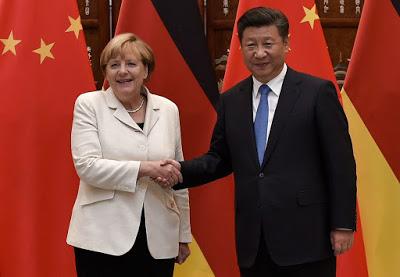
After visiting Russia's Putin earlier this week, German Chancellor Merkel is calling on China's President Xi at the end of the week. Merkel and Xi are savvy politicians, and both have raised a simple practice to a high art form: don't stop adversaries from shooting themselves in the foot.
China may be among the largest beneficiaries of recent US policy. The unilateral withdrawal from the Trans-Pacific Partnership undermined the so-called Pivot to Asia. Trump's dislike for the multilateral trading system creates a vacuum that Xi deftly tries to fill despite the obvious contradictions. The weaponization of access to the dollar funding market may have begun with 9-11, but expanded under Obama and is being pushed further by Trump. This encourages workarounds and China could be helpful, including its recently launched yuan-denominated oil futures contract.
Merkel is no slouch. She is seeking allies to check the US provocations, including but not limited to the agreement with Iran. US tariffs were ostensibly aimed at China, which Europe could have lived with, but the US wants to subject Europe to the same measures.
China removed the term limit for the head of state earlier this year. President Xi holds two other positions that did not have term limits--head of party and head of the military. It was a culmination of actions that concentrated Xi's power. The reforms ushered in by Deng Xiaoping in the late-1970s was at least in part designed to prevent the rise of another Mao. Xi's has unwound these reforms and the balance within the Communist Party between two main factions - the princelings, whose fathers and/or grandfathers were officials, and the Communist Youth League, where unconnected ambitious men can rise and be integrated into the ruling class.
For her part, Merkel is also consolidating power. It is not as